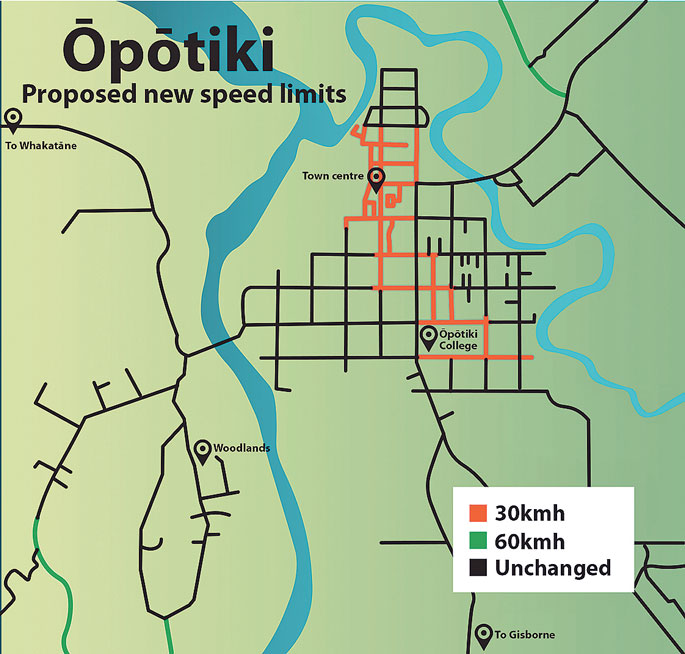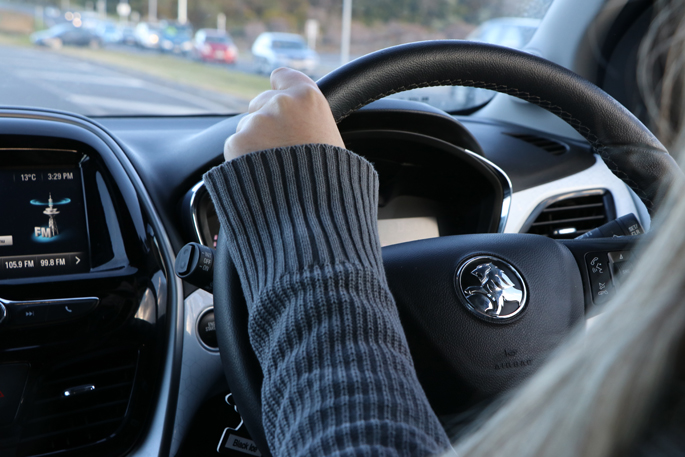Ōpōtiki District Council is seeking feedback on a plan to reduce speeds on some streets to 30km/h.
The council wants to start implementing the speed changes between August this year and June next year and Ōpōtiki residents have just over two weeks to have their say.
The council's draft Interim Speed Management Plan addresses only some of the requirements of legislation introduced last year that will have speed limits on most residential streets throughout New Zealand reduced to 30km/h.
Council asset manager Dale Clarke says the Ōpōtiki district has the highest personal risk rating in the country for pedestrian-involved crashes.
'This is a great opportunity to improve Ōpōtiki's terrible road safety statistics as we sit among the most at-risk communities in the country across a wide range of measures.”
The interim plan has 30km/h speed limitations on around 20 streets in the town centre and urban schools such as Ōpōtiki College, Ōpōtiki Primary and St Joseph's Catholic School.
In rural areas throughout the district, parts of about 14 roads are reduced to 30kmh around schools, marae and urupa.
Other speed limit adjustments to 50km/h, such as on Copenhagen Loop Road in Te Kaha or 60km/h, such as on Woodlands and Dip Roads, have been mapped out in the draft plan, which can be viewed on the council's website.
The Land Transport Rule: Setting of Speed Limits 2022 requires all road controlling authorities in New Zealand, such as councils, to either prepare their own independent speed management plans setting out safe and appropriate speed limits throughout their districts or to follow a regional process together with other local and regional councils.
New Zealand's transport agency Waka Kotahi has set out a Speed Management Guide for councils that specifies safe speed limit ranges for different categories of streets such as 30km/h for local streets (urban residential) and 40 to 60km/h for urban connectors (arterial routes connecting urban areas).
Dale says the Ōpōtiki Council has started work with neighbouring councils across the Bay of Plenty to develop a Regional Speed Management Plan, which would see a transition to safer speed limits across the district over 10 years from July next year.
He says as that plan is still some way off, this interim plan will allow the council to make some changes to keep people safer before July next year. The interim plan focused on the most vulnerable road users.
The Land Transport Rule requires councils to use reasonable efforts to reduce speed limits around all schools by 2028 with an interim target of 40 per cent of schools by July next year.
Dale says the new rules were aimed at making sure all New Zealand roads have safe and appropriate speed limits that better match a road's design, purpose and use, while also reflecting activities and places beside the road – like schools.
'It's part of the national Road to Zero strategy to minimise road death and trauma - in a crash, speed is one of the main factors in determining your chance of survival or likelihood of serious injury.
'We know that this will be welcomed by many people in the community. Some have been asking for changes in their areas for a few years and this is our opportunity to get those speed changes in place and reduce the risks for all road users.”
 Ōpōtiki District Council plans to lower the speed limit for the streets highlighted in red to 30kmh within the next year. Beacon graphic.
Ōpōtiki District Council plans to lower the speed limit for the streets highlighted in red to 30kmh within the next year. Beacon graphic.
He says the council has been working with schools and some marae committees that have road-facing areas to come up with the interim plan.
'Now we are asking the wider community for their views to add to the mix before this plan can be adopted.”
People can provide their feedback on the council website, in an email or in paper form before July 21, or they can discuss the plan in more detail at a drop-in session which will be held tomorrow, Friday, July 7, at Ōpōtiki library Te Tāhuhu o Te Rangi between 10am and 1pm.
'We'll continue to meet with stakeholders to help shape this next work. The public are also welcome to provide some early input on this bigger plan or share any areas of concern.”
The council intends to adopt the plan on August 1 and have the new speed limits in place by July next year.
-Local Democracy Reporting is Public Interest Journalism funded through NZ On Air.



1 comment
Yawwwnnnnn
Posted on 07-07-2023 12:25 | By The Professor
Yep, let's reduce the limits as a cheap fix to issues which are not necessarily related to excessive speed or higher speed limits. Instead of pissing a heap of drivers off and transport operators by reducing the speed limits across the entire country, why don't we start increasing the level of education/training required before giving out driving licenses AND educating other users using other modes of transport AND pedestrians. The onus for road safety should not sit completely at the feet of the car/vehicle driver.
Leave a Comment
You must be logged in to make a comment.